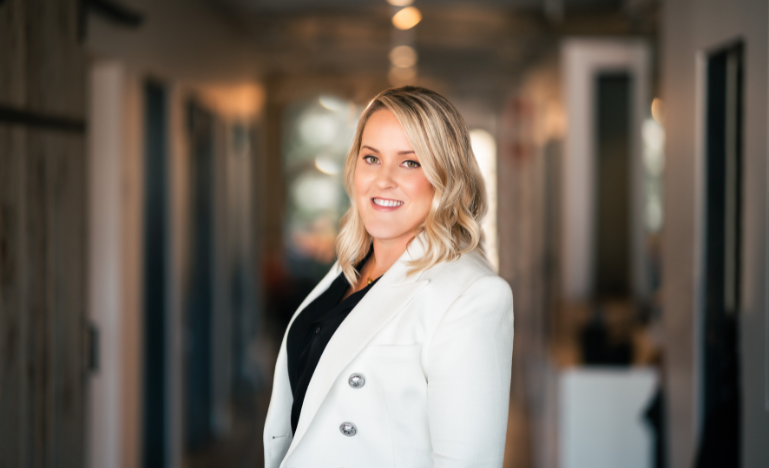A new generation of managing partners
Having managers of different ages can help with decision-making

Promoting younger lawyers into management positions can bring different perspectives to a law firm.
Morgyn Chandler became the managing partner at Hammerco Lawyers LLP in Vancouver five years ago when she was 37 years old. She says that having managers of different ages can help with decision-making.
“I think having a balanced group of perspectives around the table has been very helpful,” she says.
“If you don’t have those different perspectives, you risk turning into an echo chamber. It becomes quite dangerous because you’re no longer making decisions that are the best decisions for the business.”
During her tenure, Chandler has navigated many challenges in her firm, including the COVID-19 pandemic, changes in practice areas, the acquisition of a new law firm, the selling of the firm’s corporate department, a move and a rebranding.
“In the five years that I’ve been managing partner, we’ve become a very different law firm than we were when I took the helm.”
Philipp Park, now the Quebec regional managing partner for Miller Thomson LLP and a member of its executive committee, began managing the firm’s Montreal office in October 2019 — a few months before the COVID-19 pandemic.
“One of the things that I’ve seen is that crisis builds leadership,” says Park. “One of the things about COVID is it exacerbated leadership – you were either an effective leader or you were an ineffective leader.”
Now 52, Park was promoted into management in his early 40s.
“You have to balance between generations,” he says.
Park, who practices corporate commercial law, says that one way Miller Thomson LLP excels is by promoting collaboration between lawyers with different perspectives, including those from different generations.
At 39, Lisa Niro, the managing partner at Bell Alliance LLP, says she brings a different generational experience and perspective to the table.
“I kind of feel like I’m in the middle of two generations,” says Niro, who practices commercial and real estate law in Vancouver.
“I understand the older demographic at our firm as well as understanding the younger demographic at our firm.”
Park says that traditionally, lawyers stayed at one firm for their entire career and worked their way from the bottom to the top.
“I grew up in that environment. I thrived in that environment, but I also had no life in that type of environment,” he says.
Niro agrees that younger associates tend to look at their careers differently than older lawyers.
“For older lawyers, there was a very clear career path — articling, becoming an associate, becoming an income partner, and finally becoming an equity partner,” she says.
Younger lawyers are more flexible.
“Not everyone is looking to become a partner in a firm. They are looking for a good culture, a good environment, and some flexibility in their work schedule,” Niro says.
One challenge she faces is balancing her career as a lawyer and her career as a manager.
“You’re at a point where you're still growing your practice and reputation and at the same time trying to manage, so it is a bit of a challenge,” she says. “How do you find enough hours in a day to do both well?”
This is especially true for lawyers who are “perfectionists who like to do everything 110 per cent,” Niro adds with a laugh. “How do you dedicate 110 per cent to law, being the best lawyer you can be, and to managing a firm as well?”
Chandler also found the move into management challenging.
“I didn’t know what being a managing partner was before I became a managing partner. I mean, I knew in theory, but I certainly was not prepared for the full scope of what I was about to encounter.”
She says it’s important to start educating younger members of the firm about what is involved at the management level – everything from managing people to understanding the firm’s systems and its overhead, as well as the need to wear two hats.
“I knew about building my own practice, but I didn’t know much about managing a firm. So that was a big shift,” she says. “How do you take those lessons in terms of what makes me as an individual successful and apply them to the business at large? I had to learn a different skill set.”
Chandler says anagers need to treat a law firm like a business.
“If you’re not approaching it like a business, it won’t be a successful business,” she says. “So that was a mindset shift that I had to undergo – from running a successful practice to running a successful business.”
Niro recommends that law firms consider promoting young lawyers on a case-by-case basis.
“I wouldn’t say younger management is better. I think it depends on the person and their skills,” she says.
Park says that young lawyers sometimes don’t feel it’s a role they can take on.
“I have had a lot of calls from people saying, ‘Look, I don’t think I’m ready.’ I tell them: ‘You’ll never be ready. It’s a question of whether you are willing. And if you’re willing, then you can do it,’” he says.
Park recommends that firms allow young lawyers to lead without micromanaging.
“With the younger leaders, we give them the leeway to stumble their way forward because it’s the only way they’re going to learn,” he says.
In the process, stumbles and all, they're able to bring fresh ideas to management roles.
“Often, it’s not a 70-year-old who’s going to have an epiphany about what will appeal to a 28-year-old."


